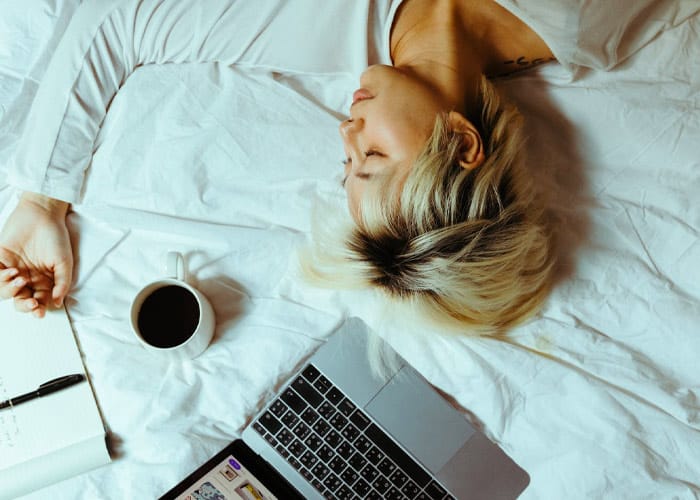Some people feel uncomfortable sleeping on big fluffy pillows, which may come as a shock. Pillows are intended to improve the alignment of the spine, neck, and head, and for most people, they are an essential bedroom accessory. However, what does this mean for people who don’t like sleeping with pillows?
Well, studies, albeit limited, have shown that sleeping without a pillow can be beneficial to you, as indicated on MedicalNewsToday. But before you toss that pillow out, keep in mind that not everyone can benefit from sleeping without a pillow, and thus I would recommend you go by what makes you comfortable.
Advantages of sleeping without a pillow
The benefits are not one-size-fits-all, and chances are, sleeping without a pillow might not help you. Sleeping without a pillow offers benefits only in certain sleeping positions.
According to Healthline, sleeping without a pillow is suited for stomach sleepers as it helps your neck stay in a natural position. For this type of sleep, the benefits include:
Streamline posture
Each sleeping position has a different effect on your posture. As mentioned above, stomach sleepers benefit more from sleeping without a pillow because it allows their neck to maintain a healthy position.
If you use a pillow, you risk placing your neck at a sharper angle, making you highly uncomfortable when sleeping on your front.
But for back and side sleepers, you need a pillow to keep appropriate spinal alignment.
While sleeping without a pillow on your stomach can help align your sine, it will not offset the unnatural position because your body is still at the centre. You can alleviate this issue by placing a pillow beneath your pelvis and stomach to lift your centre of gravity.
Relieve neck and back pain
Stomach sleepers tend to find that using pillows generate stress on their lower back by pushing the head too far back, this causing an arching spine.
But sleeping without a pillow can help align the spine when you are sleeping on your front, thus easing neck or back pain during the day.
Effects on hair and skin
Though research is still in its early stages, there are signs of a link between wrinkle formation and pillows. If a pillow presses on your face directly, it may cause skin impressions.
How about sleeping on your back? Your face won’t come into contact with a mattress or pillow. In contrast, if you sleep on your stomach, sleeping without a pillow can prevent wrinkles from forming.
Additionally, some theories suggest that pillows may damage your hair. According to the proponents of these theories, cotton fabric in pillowcases creates more friction and rivets oils that are supposed to protect your hair and can be worse for people who frequently move in their sleep.
But I should note that there is currently no evidence supporting these theories or showing the link between hair health and pillows.
However, you can do your research and come to your conclusion. If you think your pillow is responsible for dry, frizzy hair or knots, then you will be better off sleeping without one. Or consider using a smother silk pillowcase to help lessen some of these symptoms without having to change your sleeping style or use a skinny pillow.
Instead of ditching your pillow other ways of reducing wrinkles, include:
- Avoiding direct exposure to the sun
- Eating a healthy diet
- Stopping the consumption of alcohol or smoking
- Moisturising daily
Disadvantages of sleeping without a pillow
Clinical studies are currently insufficient to support either side of the argument about the pros and cons of sleeping without a pillow. Nevertheless, there are drawbacks to sleeping without a pillow. These drawbacks include:
Poor posture
If you don’t use a pillow when sleeping on your side or back this can misalign your spine and cause aches and problems in the future.
If you sleep on your front you can also hurt your posture. It’s one of the main reasons you will wake up with a sore neck. Because it’s extremely difficult for your spine’s neutral position because your body is twisted.
Negative impact on your neck
If you are a back or side sleeper and don’t use a pillow to support your head, you might experience soreness or stiffness in the cervical or lumbar spine. Also, turning your head frequently while sleeping can create muscle stiffness whether or not you use a pillow.
How to properly sleep without a pillow
Sleeping without a pillow can be intimidating at first. There are some tips you can use to help you wean and adjust.
- Start by ensuring you have a mattress that is supportive for your body size and sleeping style. In the absence of a good mattress, a pillow won’t do anything.
- Consider using a thin pillow or even a folded blanket at first so that you can adjust to sleeping without a pillow.
- If you sleep on your stomach, you may benefit more from putting a thin pillow under your hips to lift your midsection and help align your spine.

 Nectar Mattress
Nectar Mattress 


